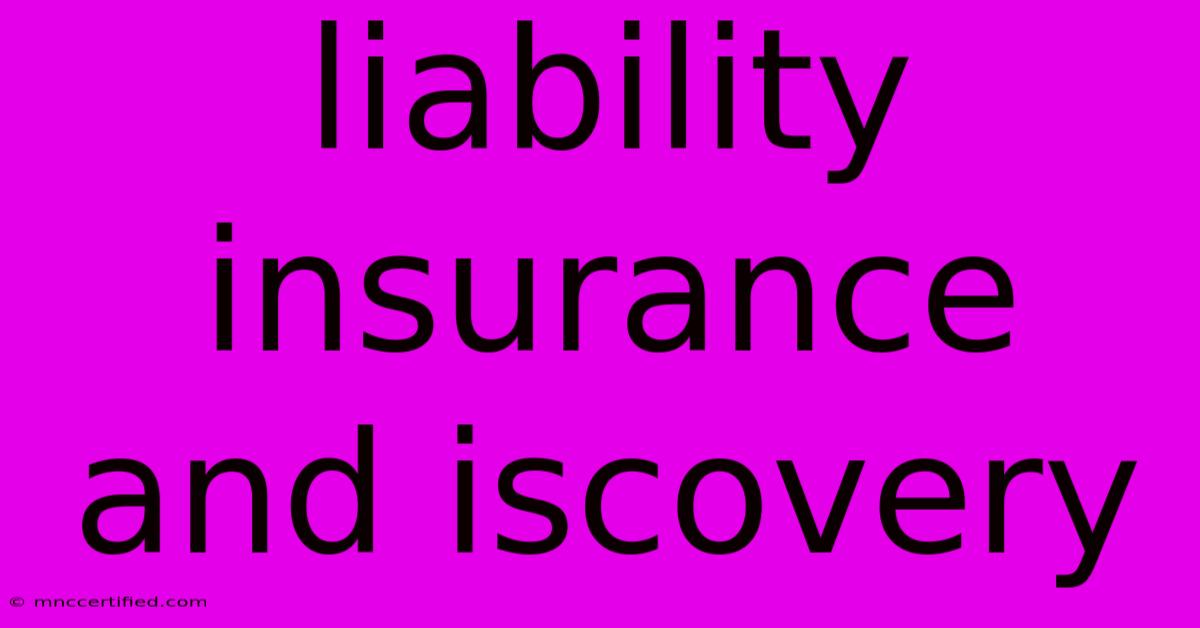Liability Insurance And Iscovery

Table of Contents
Liability Insurance and Discovery: Protecting Your Business in Litigation
Navigating the complexities of legal disputes can be daunting for any business. Understanding the crucial role of liability insurance and its interaction with the discovery process is paramount to protecting your assets and reputation. This article explores the intersection of these two critical areas, providing insights for business owners and legal professionals alike.
What is Liability Insurance?
Liability insurance protects your business from financial losses resulting from claims of bodily injury, property damage, or personal injury caused by your business's operations or products. Different types of liability insurance exist, including:
- General Liability Insurance: Covers common claims like bodily injury, property damage, and advertising injury on your premises or due to your operations.
- Product Liability Insurance: Protects against claims arising from defects in your products that cause harm to consumers.
- Professional Liability Insurance (Errors & Omissions): Crucial for professionals like doctors, lawyers, and consultants, covering claims of negligence or malpractice.
- Commercial Auto Insurance: Covers accidents involving company vehicles.
Choosing the right liability insurance policy is crucial, as coverage limits and exclusions vary significantly. Failing to secure adequate coverage can leave your business vulnerable to devastating financial consequences in the event of a lawsuit.
The Discovery Process: Unveiling Relevant Information
The discovery phase of litigation is a critical stage where both sides exchange information relevant to the case. This process aims to prevent surprises at trial and encourages settlement by allowing parties to assess the strength of their respective cases. Key discovery methods include:
- Interrogatories: Written questions requiring written answers under oath.
- Requests for Production of Documents: Demands for specific documents or electronically stored information (ESI). This is where your liability insurance policy becomes crucial.
- Depositions: Oral examinations of witnesses under oath, often including key individuals within your business.
- Requests for Admission: Requests to admit or deny specific facts.
The Interplay Between Liability Insurance and Discovery
Liability insurance plays a pivotal role during the discovery process. Your insurer will likely be heavily involved, especially if a claim exceeds your policy limits or involves complex legal issues. Here's how:
1. Duty to Cooperate:
Your liability insurance policy will likely contain a "duty to cooperate" clause. This means you're obligated to assist your insurer in defending against claims, including providing information and cooperating with the discovery process. Failure to cooperate can jeopardize your coverage.
2. Access to Information:
Your insurer will need access to all relevant information related to the claim. This includes documents, emails, financial records, and other materials potentially requested during discovery. Providing this information promptly and efficiently is crucial.
3. Defense Counsel:
Your insurer will typically provide legal counsel to defend you against claims. This counsel will manage the discovery process on your behalf, ensuring compliance with legal requirements and protecting your interests.
4. Settlement Negotiations:
Your insurer will often play a significant role in settlement negotiations. They'll assess the strength of the claim, weigh the potential costs of litigation, and strive to reach a fair and cost-effective resolution.
Protecting Your Business: Proactive Measures
To minimize risks during litigation and maximize the effectiveness of your liability insurance, consider these proactive steps:
- Regular Policy Review: Review your liability insurance policy annually to ensure it adequately covers your business's operations and exposures.
- Document Retention Policy: Implement a robust document retention policy to ensure you can readily access relevant documents during discovery.
- Employee Training: Train employees on relevant safety procedures and risk management practices to reduce the likelihood of incidents leading to liability claims.
- Maintain Accurate Records: Keep meticulous records of all business operations, including financial records, safety procedures, and communication logs.
Conclusion:
Understanding the relationship between liability insurance and the discovery process is vital for protecting your business. By proactively managing your insurance coverage and cooperating fully with your insurer during litigation, you can significantly reduce the financial and reputational risks associated with legal disputes. Remember, seeking professional legal advice is crucial if you face a liability claim. Don't hesitate to consult with experienced legal counsel to navigate the complexities of insurance coverage and the discovery process.

Thank you for visiting our website wich cover about Liability Insurance And Iscovery. We hope the information provided has been useful to you. Feel free to contact us if you have any questions or need further assistance. See you next time and dont miss to bookmark.
Featured Posts
-
Nba Refs Criticized Over Westbrook Play
Nov 21, 2024
-
10 Reasons To Buy Life Insurance
Nov 21, 2024
-
Does Drivers Ed Reduce Insurance
Nov 21, 2024
-
Delicious Crypto News Kd Tp Swap
Nov 21, 2024
-
Iceland Eruption Reykjanes Peninsula
Nov 21, 2024